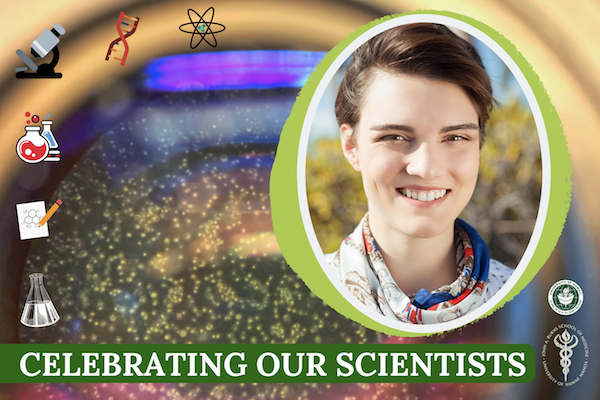
“At first, it was a simple enthusiasm for puzzling out how the world worked,” Elizabeth Laws said about her attraction to science. “During my undergraduate years, it was to cure HIV. I now appreciate that the challenges in the field of HIV research are multi-faceted and require collaborations.”
A graduate student in the Department of Cell and Molecular Biology at the University of Hawaiʻi (UH) John A. Burns School of Medicine (JABSOM) has received a grant from the National Institutes of Health (NIH) to study the affects of acute HIV infection on the brain. Elizabeth Laws was notified about the F31 grant in August 2019.
The NIH F31 provides support for supervised research training designed to enhance their potential for becoming productive independent scientists. JABSOM has received several F31 training grants in the past ten years (see Table) and celebrates the success of these awardees who competed with top institutions across the country and have contributed to a diverse workforce.
Laws applied to conduct her work under the primary mentorship of Dr. Lishomwa Ndhlovu and in collaboration with Yale University and the U.S. Military HIV Research Program (MHRP). She explained that 30-40% of HIV-infected individuals exhibit cognitive deficits despite optimal antiretroviral therapy. “Though mild compared to the early days of the epidemic, these complications significantly impact daily living, especially among those aging with HIV.”
Laws’ research investigates how immune cells called monocytes may carry HIV to the brain and trigger damaging inflammatory processes that can impair cognition. “We have developed sophisticated methods to study these cells during the earliest time after infection,” she said.
In 2013 Laws obtained two undergraduate degrees, a B.S. in microbiology and a B.A. in philosophy, from Washington State University. For her doctoral studies, she decided to build on her background in molecular virology and joined Dr. Ndhlovu’s laboratory because his translational, immunology-focused HIV projects matched her interest in neuroHIV research. Laws is currently in her fifth year of the Ph.D. program and may graduate in the spring of 2020.
“At first, it was a simple enthusiasm for puzzling out how the world worked,” Laws said about her attraction to science. “During my undergraduate years, it was to cure HIV. I now appreciate that the challenges in the field of HIV research are multi-faceted and require collaborations.” She draws continued motivation from trying to answer the next testable research question.
Laws’ immediate objective is to complete her Ph.D. by pursuing the aims for which the F31 award was given. In the longer term she would like to perform independent neuroHIV research. “Ultimately, we hope to develop new therapies to prevent or slow the development of brain-related complications in people living with HIV.”
Laws also enjoys snorkeling in Hawaiʻi and has an impressive familiarity with marine life. “Typically, we have the black-haired Naso tang (Naso lituratus), but I once saw a blonde-haired one,” she recalled. “Sure enough, it is a different species (Naso elegans) found primarily in the Indian Ocean instead.” Laws grew up in Seattle and her favorite place outside Hawaiʻi is still “the damp, rainy, foggy Pacific Northwest.